Dear Secretary Clinton,
The State Department briefing of August 2 details your goals while in the Democratic Republic of Congo this week. So many Congolese will be happy and hopeful that you are visiting the hellish landscape of the Kivus.
From Angola, the Secretary will move on to the Democratic Republic of the Congo. In the Congo, she will have two stops. She will go to Kinshasa first and then will proceed the next day to Goma in the eastern region. She intends to meet with President Kabila and the Congolese foreign minister. During that stop, the Secretary wants to put a great deal of focus on the issue of sexual- and gender-based violence which is occurring in the eastern Congo.
As many of you know, the eastern Congo has been torn by civil strife, a great deal of conflict since 1994, 1995, largely as a result of the movement of ex-genocidaires from Rwanda into the eastern Congo. The Secretary is deeply concerned about the gender-based violence, which is occurring in the eastern Congo, will underscore America's commitment to try to end this gender-based violence, and will meet with some of the victims who have suffered from it.
We will also - the Secretary also intends to encourage and push the Congolese Government as well as MONUC, the UN peacekeeping force there, to take a much more aggressive stance against gender-based violence. The Secretary will also encourage the Congolese Government to continue its democratic progress, and will also encourage the government to take action against corruption and to improve its economic and fiscal management so that it can - its country's resources can be used for development.
This is great, that you are going there and all, but you know, Human Rights Watch and the independent press and Eve Ensler and all kinds of folks have been documenting the horrors of rape and euphemistic "gender based violence" for quite some time now. I know you will not have a lot of free time there, so perhaps you could skip one or two interviews and go to the Mugunga II Refugee Camp. This camp has been in existence since May 2007. When I was there in January of this year, I was told there are approximately 20,360 internally displaced persons in Mugunga II. You will find a small city with no infrastructure, electricity, sanitation or medical care. The population is comprised of roughly 7,000 children, many of whom were orphaned by the war. There is a child there in block 35 and here is the photo I took. I wonder if this child is alive. Could you please find the family and let us know?
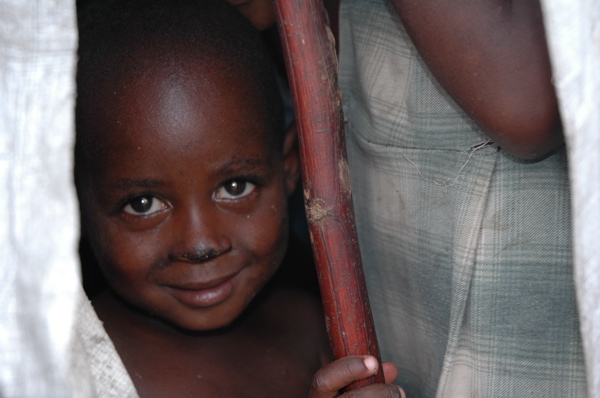
His house looks like this, but then they all look the same. You might have to show the photo around.
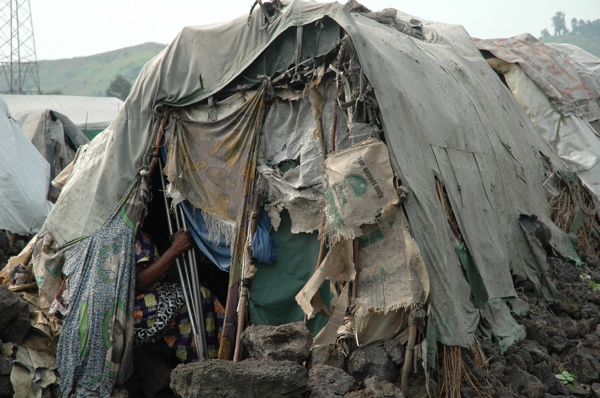
Or maybe someone from your advance team can find his mom.
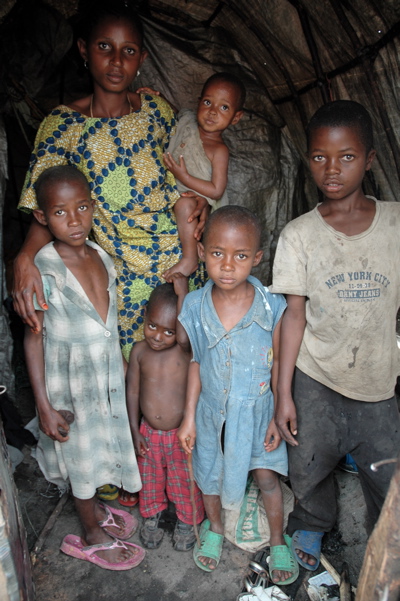
Perhaps I can save you some time and offer this partial testimony. Women, constant targets of sexual violence, are eager to step forward with their stories and offer witness. We recorded this at the camp. It is the same everywhere, really, and one story echoes 10,000 stories. How many times do we really need to listen to the stories before we do something about it? You are a smart tough woman. I wanted you to be president. Don't be snowed by Kabila and what he will tell you while you are in Kinshasa. It is more important what you will see in eastern Congo. You won't have to risk your neck and go too far from Goma to locate the sources of the violence.
Mugunga II camp is near three other sites of Mugunga III, Buhumba and Bulengo. These "cities" are the legacy of fighting in North Kivu Province that intensified at the end of 2006. I saw these kids along the road and they had just snared this raptor for dinner. Perhaps you might also try to find them and see how hunting has gone for them.
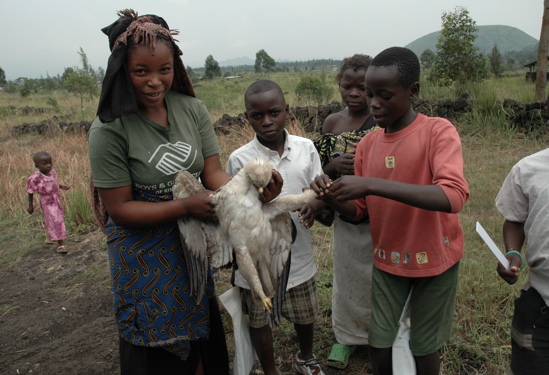
I really hope you will have the stamina not be managed by representatives of the United Nations under Alan Doss or become a victim of the Kabila government's frequent dog and pony shows for visiting American celebrities -- and make no mistake about it, you are considered a celebrity in Central Africa, especially after your husband apologized for our inattention during the Rwandan genocide. Up to one million were killed then, and we are going on figures of up to six million in DRC due to the war and murder and disease. Did you see this church when you were in Rwanda a few years ago?
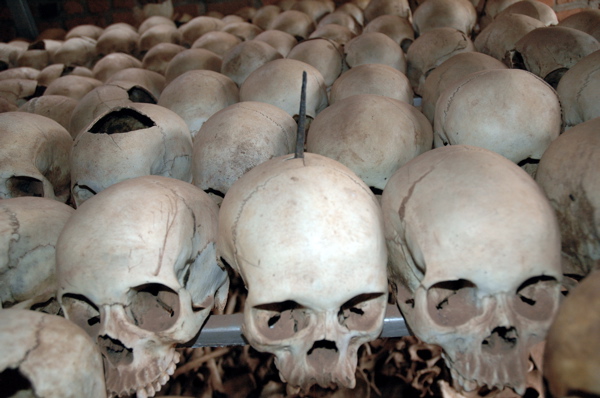
The people in Congo actually believe that you will help them. I am referring to the people in the refugee camps. The leaders at Mugunga II handed us a written request when we were there in January. They needed some mattresses so the babies do not have to sleep on the rocks, some cloth for covering the babies, and water containers and pots for cooking. Can you please let us know if they have received these things?
You see, Secretary Clinton, people in Central Africa really believe that if they meet an American, especially a writer, that we can get messages through to our government. My team sent you a detailed letter through the State Department from representatives of the CNDP and it was ignored, but now that their former leader, General Laurent Nkunda, is under illegal house arrest in Rwanda I can understand how you would not want to be involved in that mess.
Is that why you are bypassing Rwanda on this trip?
Human Rights Watch has been very critical of the government in Rwanda. So perhaps you will take their suggestions to heart. At the top of the list is the immediate arrest of Bosco Ntaganda, a general in the Congolese armed forces who is sought on a warrant from the International Criminal Court. Ntaganda is currently playing a senior role in operations supported by UN peacekeepers. Bosco was instrumental in the toppling of Laurent Nkunda and even the Interim Report of the Group of Experts, which was released in May and ignored by the Security Council, explains in great detail how things have gotten much worse since the joint Rwandan/Congolese operation of last January.
On May 18 Turkish diplomat Baki I`lkin sent the Interim Report of the Group of Experts on the Democratic Republic of the Congo to the United Nations Security Council. I`lkin's cover letter sounded hopeful, but resigned. "I would appreciate it if the present letter, together with its enclosure, were brought to the attention of the members of the Council and issued as a document of the Council."
Baki I`lkin's report detailed massive airlifts of arms and ammunition to the Congolese military (FARDC) through Khartoum, Sudan. The Group of Experts obtained information to the effect that arms and ammunition were transported to FARDC in December 2008 and February 2009. The military equipment was loaded at Khartoum International Airport on to a Boeing 707 aircraft registered in the Democratic Republic of the Congo that had been requisitioned by the Ministry of Defense of the Democratic Republic of the Congo in September 2008. Flights of the aircraft occurred on 4 and 5 December 2008, and on 12 and 14 February 2009. The Group has submitted a request to the Permanent Mission of the Sudan for further clarification. The Group is concerned that continued violations of paragraph 5 of resolution 1807 (2008) could further hinder mechanisms to promote effective stockpile management by FARDC, which is, as you know, the regular Congolese army. FARDC has been involved in massive human rights violations in eastern Congo. I hope you have been briefed on this. This is a stunning report, especially given the tremendous US presence in Sudan, and a United Nations base at Khartoum.
The Special Rappateur has asked for serial numbers, identification numbers, and marking codes. It is hard to imagine that the recent airlifts of munitions from Sudan to Congo could have gone unnoticed by the State Department and its agents, given our intense military and espionage presence in the region. Do you think you might be able to ask Kabila for these serial numbers?
A US-based public relations representative for the Kabila government, Joel Frushone, asked me to interview one of Kabila's ministers recently. I will not publish her name because Kabila will probably punish her for not winning me over. My sense was that she was a good woman in an impossible job. I asked her to get the serial numbers for me, but no luck. The minister detailed all kinds of programs that Kabila has ostensibly put into place for women and children. Make sure you ask if there is any money in the Kabila budget for this. When I asked the question, the minister was embarrassed to say there was no funding even though Kabila has made a big show about all of the laws he has in place now for women and children. It is really a sick joke considering it is the Congolese army which is committing so many of the atrocities.
You will easily recognize FARDC soldiers if you can break away and risk your safety for a few hours in secret in Goma. They are the guys staggering drunk through the streets and shooting out the windows of foreign aid vehicles. Villagers reported in late July that Caritas Internationalis aid worker Ricky Agusa Sukaka, 27, was shot dead in Musezero, North Kivu, on the way home from work. He was a Congolese national and was stopped by two men wearing Congolese army uniforms before he was killed. They wanted his T-shirt. Do you have any State Department T-shirts you could hand out? It might save a few lives.
Lesley-Anne Knight, Secretary General of said, "Ricky Sukaka bravely worked in a war zone to help others rebuild their lives. The brutality and killing in Congo has got to stop. Caritas calls on all the groups involved to sit down at the negotiating table and work for a lasting peace."Violent clashes between the army and rebels have left almost one million people displaced in North and South Kivu. Armed groups frequently inflict killings, rapes, looting and violence on a population which remains largely without protection.
Those who leave their homes fearing for their lives often end up in camps where they have to rely on external help to access basic necessities such as food, water and clothes.
Here is a link to a HRW letter sent to you that you may or may not have had the opportunity to review. This quote might be all that you have time to read:
Your visit to the DRC provides an excellent opportunity to focus a spotlight on the prevalence of sexual violence in the eastern Congo. Despite improved relations between Congo and Rwanda, the situation in eastern Congo has become increasingly catastrophic for the civilian population, especially for women and girls. Since the launch of military operations in December 2008 against the Rwandan Hutu militia, the Democratic Forces for the Liberation of Rwanda (FDLR), and the Ugandan armed group the Lord's Resistance Army (LRA), rebel forces and Congolese army troops altogether have killed more than 1,500 civilians and raped thousands of women and girls. More than a million people have fled for their lives from these conflict areas, adding to the tens of thousands of others displaced from earlier waves of violence.Much has been done recently to raise awareness of the use of rape as a weapon of war in Congo, where, since 1998, tens of thousands of women and girls have been raped. Despite such efforts, the prevalence of rape is not decreasing. In nearly all the health centers, hospitals, and rape counseling centers visited by Human Rights Watch in nine frontline locations since January, rape cases had doubled or tripled since the recent resumption of military operations. While all sides continue to use rape and other sexual violence as a weapon of war, soldiers from the Congolese army have perpetrated the majority of rapes.
Military operations, supported by UN peacekeepers, against the foreign rebel groups are not adequately taking into account protection of the civilian population, including women and girls most at risk, and insufficient pressure has been exerted on the Congolese army to stop abuses or punish those responsible. To date, no generals have been prosecuted for crimes of sexual violence. In early July 2009, the government publicly proclaimed a policy of "zero tolerance" for human rights violations by the army. While a step in the right direction, making such a policy a reality will require investigation and prosecution of senior army officials allegedly involved or complicit in sexual crimes.
This is the handiwork of the FARDC and FDLR, in case you don't have the time or security to visit these villages.
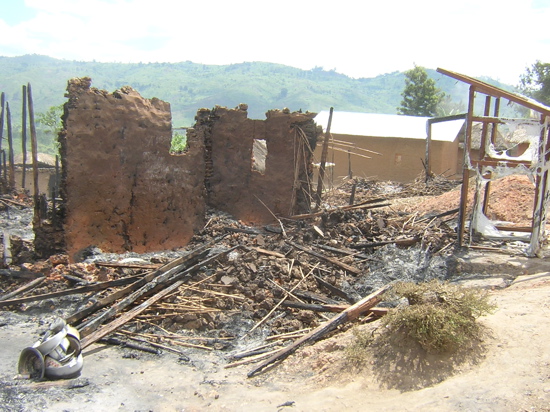
Meanwhile, a Global Witness report says that the government of Rwanda has done nothing to stop the transport of illegally obtained minerals from Congo from crossing its borders. Rwanda has dismissed these reports, but it does seem like more than a coincidence that Rwandan President Paul Kagame tricked Laurent Nkunda into coming into Rwanda in January, and then "detained" him with no legal recourse. This was after Nkunda gave several public interviews regarding his belief that the resources of Congo belong to the Congolese and not the Chinese and certainly not the Rwandans. But, Secretary Clinton, you are also going to China to shore up trade there and the Chinese have signed a deal with the corrupt Kabila government. The Chinese are promising infrastructure in trade for resources, but the average Congolese won't benefit from this deal. Kabila will be able to add to his motorcycle collection and purchase additional mansions in the US and in Kenya, but what the Congolese really need is a decent government and responsible, moral leadership.
Informed by on-the-ground investigations and interviews in North and South Kivu, the report reveals that despite being on opposing sides, the national Congolese army and rebel groups, in particular the FDLR, regularly cooperate with each other, carving up territory and occasionally sharing the spoils of illegal mining. It warns that the recent integration of another armed group, the CNDP, into the national army will make it easier for the former rebels to get 'in on the act' of exploiting the mines. "Despite recent political and military developments, including the apparent rapprochement between the DRC and Rwanda, violence against unarmed civilians is continuing and countless lives are lost each day. All the warring parties in the DRC are systematically using forced labor and violent extortion in mining areas," said Patrick Alley, Director of Global Witness.
Secretary Clinton, you will, if you break away from your handlers, learn a lot. Please try.
I almost forgot about this little guy in Block 35 at Mugunga II.
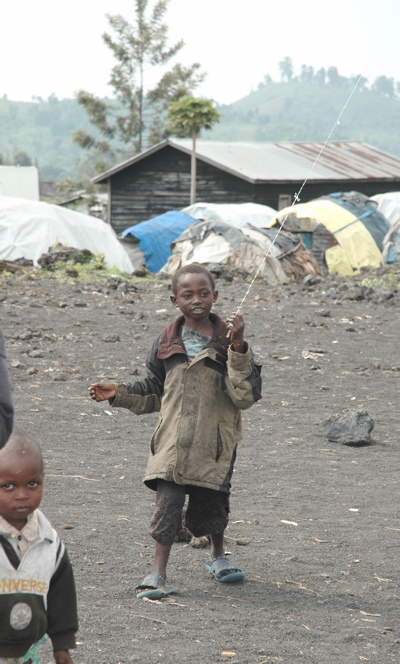
He found a discarded piece of plastic in the dump and wanted me to take a photo of it. Here it is.
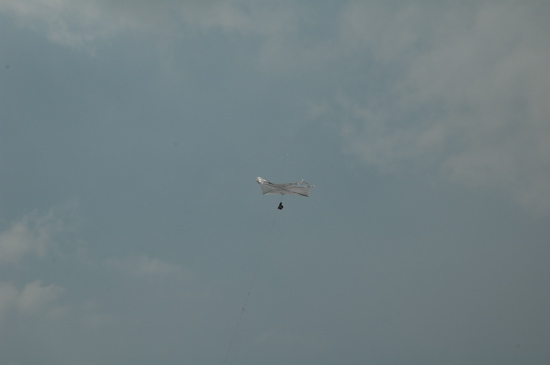
A clear piece of plastic does not show up very well against the blue sky, but he sure was proud of the fact that it was flying. It almost had wings -- hope is the same. All he has is his kite and hope that we will remember him, and sometimes hope is transparent, too.
Maybe you could show it to him? Could you perhaps bring him a real kite and tell him it is from the Muzunga who visited with him in January?
I'll send you the money when you return. Thanks.
PS I know my tone is bitter, but if I go into compassionate mode, the tears come too quickly and I can't even begin to write. I do have faith in you. I think the world needs strong women to get us all out of this mess.
